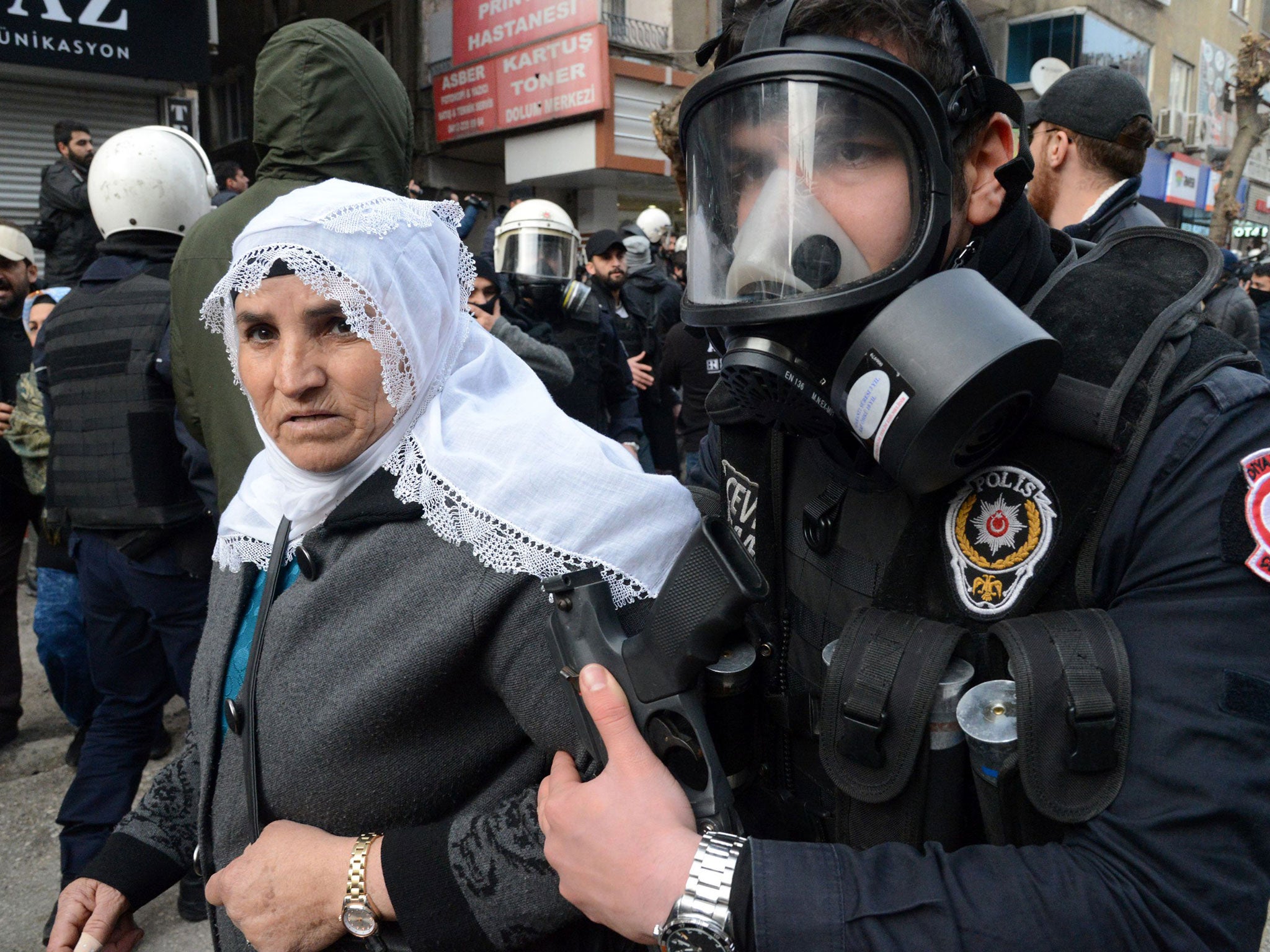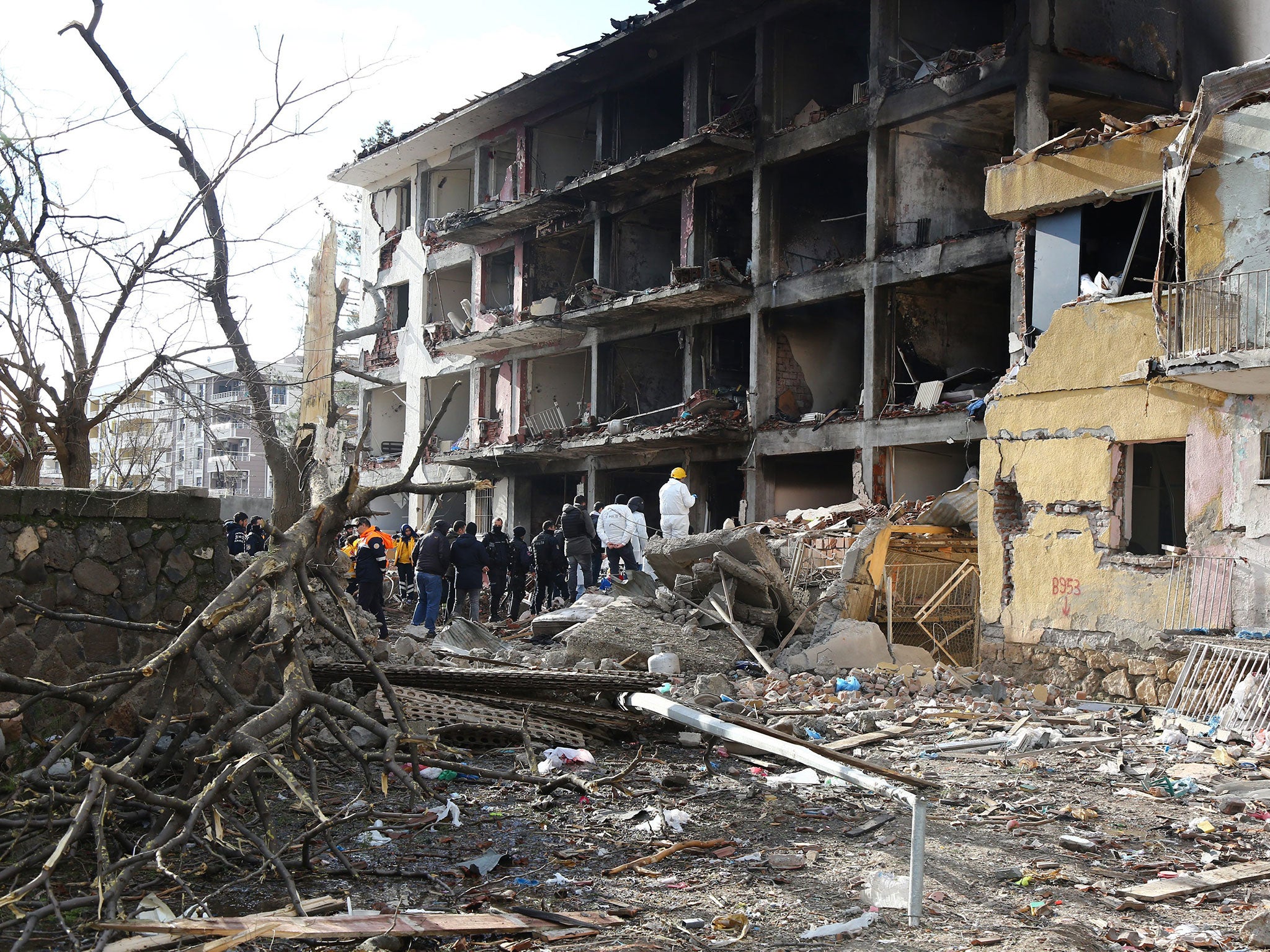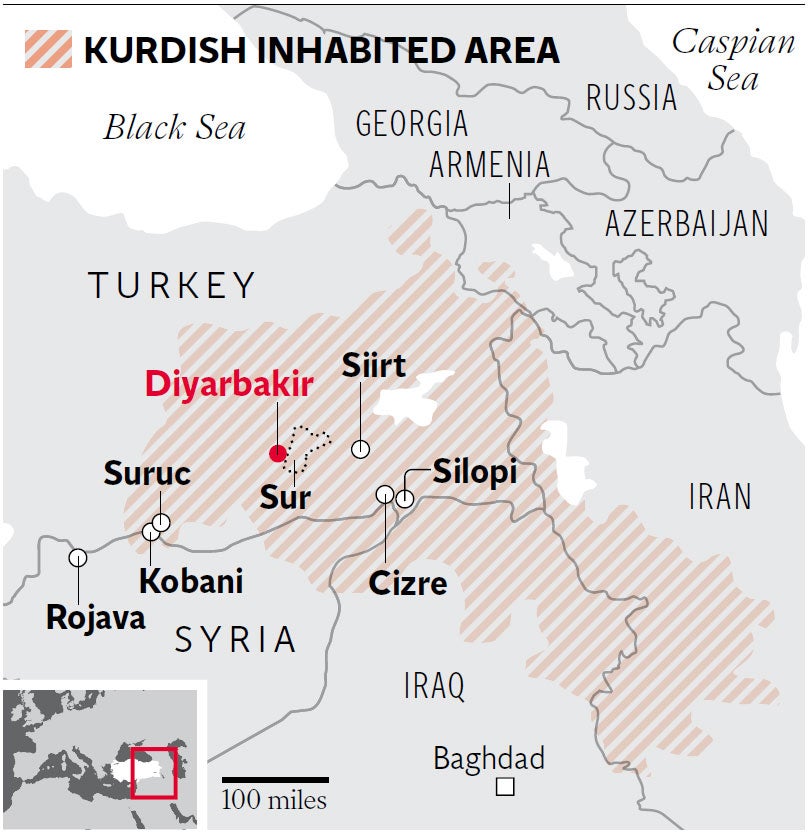Turkey in crisis: 'Ripple effect' from Syria and Iraq sees worst flare-up in Kurdish conflict in 20 years
As pressure creeps in from Syria and Iraq, the strain between the Turkish state and Kurdish forces grows as previously isolated fighting reaches towns and cities. Laura Pitel reports from Diyarbakir in the first of a three-part series

Your support helps us to tell the story
From reproductive rights to climate change to Big Tech, The Independent is on the ground when the story is developing. Whether it's investigating the financials of Elon Musk's pro-Trump PAC or producing our latest documentary, 'The A Word', which shines a light on the American women fighting for reproductive rights, we know how important it is to parse out the facts from the messaging.
At such a critical moment in US history, we need reporters on the ground. Your donation allows us to keep sending journalists to speak to both sides of the story.
The Independent is trusted by Americans across the entire political spectrum. And unlike many other quality news outlets, we choose not to lock Americans out of our reporting and analysis with paywalls. We believe quality journalism should be available to everyone, paid for by those who can afford it.
Your support makes all the difference.When men and women of south-eastern Turkey used to join the armed Kurdish insurgency, their families would say they had “gone to the mountains”. Much of the fighting between the outlawed Kurdistan Workers’ Party (PKK) and the state happened in the hills, but now it has reached towns and cities such as Diyarbakir.
The old walled part of the Kurdish cultural capital has been under near-continuous lockdown since 2 December. Police and soldiers battle youths linked to the PKK who dug trenches in the backstreets of the area known as Sur and declared it an “autonomous zone”.
The death of six people, including three children, in the bombing of a police compound near the city last week raised fears that the conflict is escalating. Yesterday a police officer and soldier were killed by sniper fire and two Kurdish militants were shot dead.
The sound of gunfire crackles across Diyarbakir, punctuated by the thump of heavy artillery. Masked officers patrol sandbagged checkpoints and fighter jets tear overhead toward PKK targets in the mountains of northern Iraq.
A cloud of depression hangs over the city. Locals wryly observe that even the Syrian refugees have packed up and left. “Normally we go and meet with friends in cafés, we drink beer in bars,” said a 30-something who asked not to be named. “But now, when we drink or do things we love, we judge ourselves. People are being killed just on the other side of the wall. We feel guilty even when we have sex.”
In a conflict that has dragged on since 1984, this is the first time that so much of the fighting has taken place in urban centres. A string of towns across the region have been placed under round-the-clock curfews. It is civilians who have paid the price. Thousands have fled their homes. Kurdish groups claim that at least 38 civilians have been killed in Diyarbakir after being caught in the middle. They include a mother-of-three who died after a rocket or shell smashed into her home as she shared a family meal.

In the past six months Turkey has experienced the worst flare-up in the Kurdish conflict since the dark days of the 1990s, a time marred by disappearances and executions. The return to violence has fuelled concerns that Turkey, seen in the West as a vital buffer between Europe and the chaos in Syria and Iraq, is itself becoming increasingly unstable. Turkey’s 15-20 million ethnic Kurds see themselves as distinct from the Turkish majority. They have their own language and cultural heritage, and many feel sidelined and oppressed by the state’s definition of Turkish citizenship. It is epitomised for them in the declaration by Mustafa Kemal Ataturk, the founder of modern Turkey, that became the national motto: “How happy is he who says: I am a Turk.”
The ruling Justice and Development Party (AKP) did more than most of its predecessors to improve Kurdish rights, with a series of cultural and linguistic reforms. For a time it seemed its leader, Recep Tayyip Erdogan, might finally solve the Kurdish issue. His government entered negotiations with the jailed PKK leader Abdullah Ocalan, who called a ceasefire in March 2013. But the war in neighbouring Syria – and a series of polarised elections – hampered the process. The success of Syrian Kurdish forces linked to the PKK has deeply unnerved Turkey’s political leadership and the military. It has complicated the relationship between Ankara and its Western allies, who, despite deeming the PKK a terrorist organisation, have supplied arms to its offshoot in Syria.
The spark for current unrest can be traced to the near-fall of the Syrian Kurdish town of Kobani to Isis in October 2014. Turkey was accused of failing to stop an impending massacre. At the eleventh hour, it opened a corridor for Peshmerga fighters from Iraqi Kurdistan to enter the besieged town, but not before protests had rocked Diyarbakir and other south-eastern cities, leaving at least 19 dead.
Today the name of the town is graffitied across Diyarbakir. “Kobani became a very important example for us,” said Recep, a 24-year-old construction worker. “People in Kobani didn’t just talk. They defended themselves. That’s what we learned.” The episode compounded a belief among Kurds that Turkey was helping Isis to quash Kurdish forces in Syria. The Turkish state worries that Kurdish gains in northern Syria have bolstered the confidence and arms caches of the PKK, as well as encouraging Kurdish separatism. The voices of young people do little do dispel the latter concern. They speak in excited tones of the autonomous Kurdish zone of Rojava in north-eastern Syria, describing it as “model” for the whole region.
As the conflict in Syria dragged on, the newly-formed People’s Democratic Party (HDP), led by a young, charismatic Kurdish human rights lawyer, was growing in strength.
In June last year, it became the first explicitly pro-Kurdish party to enter parliament. Its success cost President Erdogan the majority he needed to turn his nation into a presidential system, an ambition at the centre of the election campaign. Having dominated Turkish politics for more than 10 years, it was a significant blow to his authority.
Just two days before the election, four HDP supporters were killed at a rally in Diyarbakir. When a second bombing hit another Kurdish gathering the following month, this time in the border town of Suruc, a PKK offshoot responded by killing two policemen in a “retribution operation”. Mr Erdogan gave the go-ahead for airstrikes against PKK targets. The ailing peace process was officially dead.
After coalition talks failed, the president ordered a re-run of the June election. Warning the electorate that they must choose between stability and chaos, he was rewarded with almost 50 per cent of the vote. The HDP claimed the campaign was deeply unfair given a series of legal, political and physical attacks on its staff and candidates.

Many Kurds believe that Mr Erdogan abandoned hopes of winning their votes after the Kobani debacle and instead courted a nationalist demographic with harsh rhetoric and clampdowns on Kurdish politicians. They accuse him of stoking the conflict to bolster his electoral prospects. The PKK, which says it is fighting for regional autonomy and greater cultural freedom, also had much to lose from the success of the HDP. The party offered the real prospect that politics rather than violence could solve the Kurdish problem.
Hopes that the end of the second election campaign would end violence have proved to be misplaced. The Turkish government has vowed to continue fighting until the south-east is “cleansed” of fighters. Despite escalating operations, the state has yet to regain control of Sur or areas under curfew in Cizre and Silopi.
The fear for Turkey’s allies is that the Nato member, a key partner in both the battle against Isis and the European refugee crisis, cannot cope with any more instability.
Last week saw two major bombings at the opposite ends of the country. An Isis suicide bomber claimed the lives of 10 tourists in Istanbul. The following day came the attack on the police lodgings near Diyarbakir.
Despite the role of young PKK supporters in bringing conflict to the cities, it is hard to find many willing to publicly condemn them. One local admitted: “We will criticise them among ourselves but not to outsiders. Because we will always think that the government is worse.”
Most believe that peace talks must come eventually, but analysts warn that the acrid political climate is badly damaging national cohesion. “There’s no other option but to return to the negotiating table. It can’t go on like this,” said Raci Bilici, head of the Diyarbakir branch of Turkey’s Human Rights Association. “Both sides know this well. The issue can’t be solved with violence. The PKK can’t win and neither can the state.”
Join our commenting forum
Join thought-provoking conversations, follow other Independent readers and see their replies
Comments